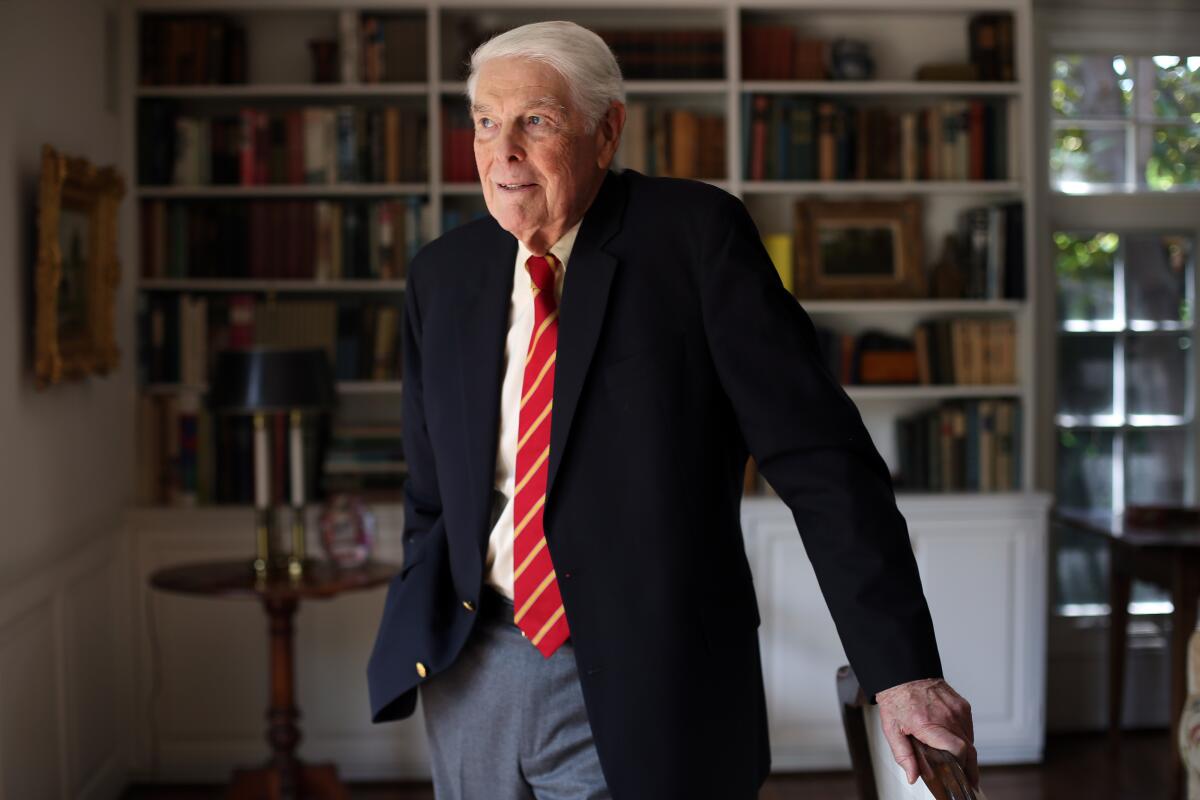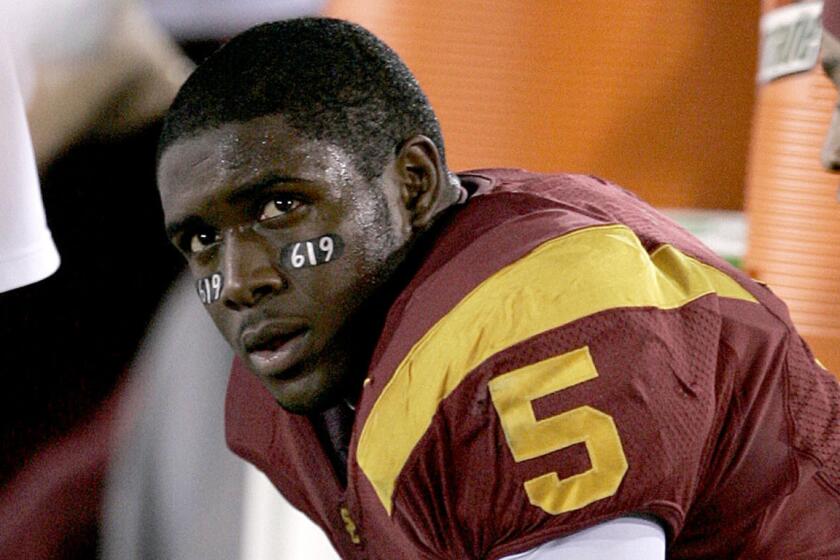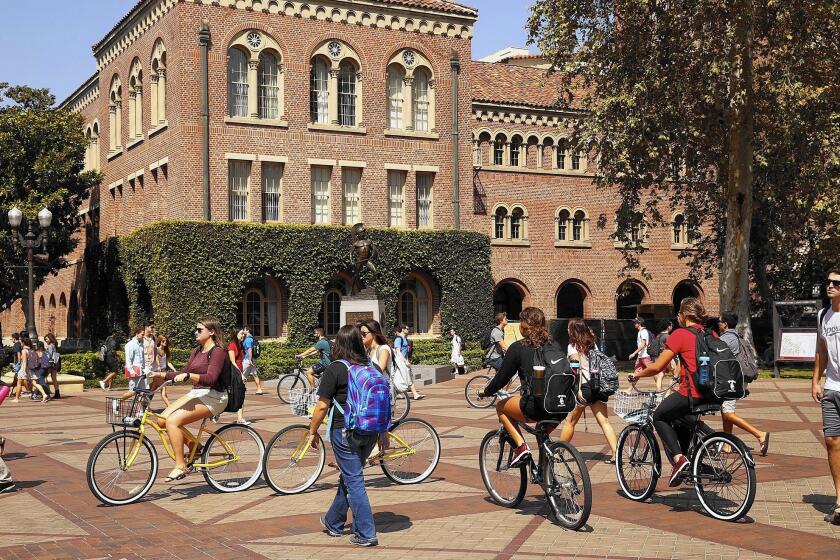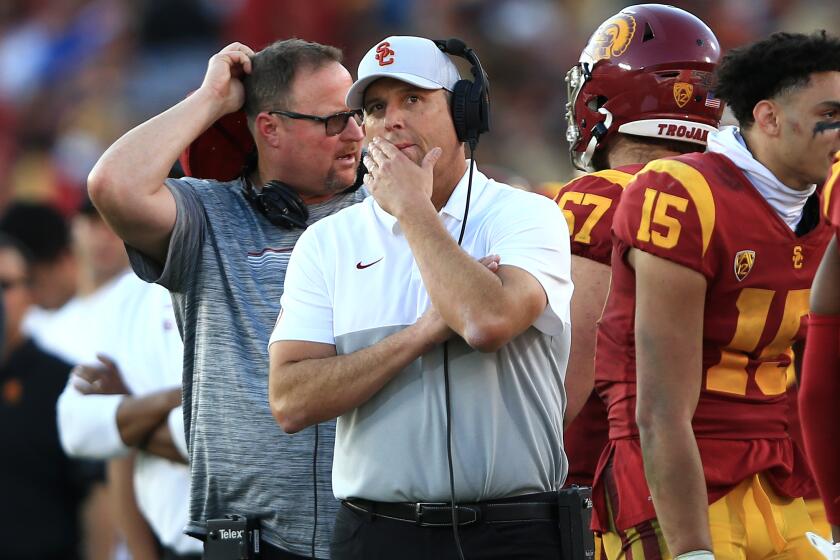Column One: USC graduate picked up where he left off more than 60 years ago

Finish what you start.
For years the phrase gnawed at Tom Capehart, a four-sport, four-year USC student-athlete who never quite completed the conquest.
Do it right or don’t do it at all.
For years, USC was on his resume, but it wasn’t. USC was on his sweatshirts, but not his wall. USC occupied his heart, but not his legacy.
In an era of big stories about college sports stars who can’t wait to leave campus, this is the little tale about one who spent a lifetime aching to get back.
Tom Capehart, 85, will be the literal definition of a graduating senior this week when he passes a two-credit course and completes his pursuit of a USC degree.
Sixty-four years after he started.
The epitome of old school will graduate with a transcript of classes that no longer exist, mostly earned on a scholarship that has long since expired, and one ageless cheer.
“I’m out of there!” he said.
Capehart began his improbable journey as a poor kid from the central California farm town of Kingsburg whose life was forever changed when he attended USC on an athletic scholarship from 1952 to 1956. He played football, basketball, water polo and swam. Yet, when his four years were complete, he was four credits short of graduation, and he couldn’t afford to finish.
“My scholarship ran out and I didn’t have any money,” he said. “I had to go to work.”
He proceeded to build a thriving insurance and pension business. He became a charitable cornerstone in the Pasadena community. He became a USC athletic donor who was a regular at university sports events. He’s been married to wife Karen for 63 years; they have two sons and four grandchildren and built a life with riches that stretch far beyond ragged beginnings.
Yet the man who has everything defined himself by the one piece of paper he didn’t have.
“It bothered me my entire life,” he said. “I know I was an athlete, but I went to school to get an education, and I didn’t get that degree, and it left me unfulfilled.”
Last fall, during a donors luncheon, USC assistant athletic director Scott Wandzilak heard about the situation. Capehart explained that he had taken a two-credit night course in 1958 but, all these years later, was still two credits shy of graduating.
“I had tried a couple of times, but the course I needed didn’t exist anymore,” Capehart said. “I had pretty much given up.”
Wandzilak understood the red tape involved in navigating a giant university, and he had an idea.
Reggie Bush wasn’t allowed to benefit from the use of his name, image or likeness while playing at USC. But he feels he influenced the expected new NIL rules.
”In listening to him talk about how he lived his life and all he accomplished, you could tell that being so close to the finish line and not getting his degree was really eating at him,” Wandzilak said. “I told him, ‘Let’s give it another shot.’”
The university dusted off Capehart’s ancient academic records, scoured the depths of their curriculum, and figured out how he could earn his degree with a two-credit directed research class.
But this was no gimmick. Capehart insisted on returning as a regular student. He paid tuition, showed up for weekly classes, aced the course, and this week will be awarded a bachelor of science degree in education.
“I’m not sure how I’ll get my diploma, I don’t really know. But it doesn’t really matter,” he said. “I didn’t do this for a piece of paper. I did it for me.”
On Thursday, he will share a bit of his story as one of the speakers at the virtual graduation ceremony for USC student-athletes. He won’t be wearing a cap and gown. There will be very little ceremony. Yet his taped message will be draped in pomp and teeming with circumstance.
“I’m sure you’re wondering what an old man like me is doing speaking to the graduating class of 2020!” he will say. “Well, so am I!”
::
The college kids who would peek into associate professor Angela Hasan’s downtown USC classroom on weekday afternoons this winter always asked the same question.
“Who’s the old guy?”
“He’s one of my students,” she would reply.
“No, seriously,” they would answer.
It was hard for even Hasan to believe it in January when former athlete Capehart, always dressed in sport coat and dress slacks, first walked into her campus office to begin work on his final course.
“I have never experienced anything like this, ever,” the veteran educator said. “I have never had anyone close to his age, but also never had anyone close to his energy.”
Capehart could have asked for an extension of his scholarship, but instead he paid nearly $4,000 in tuition for the class. He could have conducted most of the class remotely, even before the pandemic shutdown, but he insisted on driving downtown once a week for four-hour sessions with Hasan in a conference room, often showing up 30 minutes early because he was worried about traffic.
A virtual sports internship program at USC will help students this summer who had their original summer internship displaced by COVID-19.
He paid for parking. He stood in line in the cafeteria for lunch. Instead of a backpack, he carried a briefcase, but otherwise he was a regular student.
”My other students were shocked, they couldn’t believe it, they couldn’t wrap their brains about it,” Hasan said. “You just don’t find an 85-year-old individual sitting in a classroom.”
His assignment was to write a research paper that is usually 30-40 pages. He wound up writing an autobiography of about 220 pages.
“We’re talking about the autobiographies of other people when I realized the most compelling story would be his,” Hasan said.
Capehart grew up in a house with no running water. His mother died when he was 4. His father was a day laborer who grew ill several years later, and he spent much of his childhood raised by families of friends.
He was 6 feet 3, 218 pounds, a star athlete who could have signed out of high school with the Boston Red Sox. But his high school coach, Laurence Langley, a former USC football star, gave him advice that stuck with him.
“He told me, ‘There is nothing more important than an education,’” Capehart recalled. “I followed him then. I’m trying to follow him now.”
So he attended USC, where he played football and a basketball for a season before a knee injury cut his careers short. He then took up water polo and swimming even though he was beset with the most untimely of allergies.
His swimming teammates called him “the puker” because an overabundance of pool chlorine would make him vomit, yet he still swam for three years.
“It wasn’t enough to make me quit,” he said. “Things happen, you stick it out.”
It was thus with great regret that in his senior year, the university didn’t offer the one four-credit class he needed for graduation, an odd seminar that featured boxing, wrestling and gymnastics.
“I couldn’t wait around a year, I had to start my life, I didn’t have a choice,” he said.
He never claimed to graduate, but everyone assumed he did, and he hated that. His resume was always correct — it read that he attended USC for four years, not that he received a degree — but the words always looked a bit empty.
“It was like a black cloud over his head,” his oldest son, Bryan, said. “He’s always, always finished everything.”
The story of his journey was so well-crafted, Hasan wanted to invent a new grade for it.
“I gave him an A, but I wish it could have been an A-plus,” she said. “He is truly an example of how it’s never too late.”
After failing to keep up with most of the Pac-12 in the recruiting game, Clay Helton and his staff are adopting a different approach to lure recruits.
Capehart wants to turn the project into a published book, although the title needs some work.
“He wanted to name it, ‘The Graduate,’’’ Bryan said. “I told him, ‘I think that title has been taken.’’’
Whatever it’s called, it probably will end as he will end Thursday’s brief commencement speech to his fellow student-athletes.
“Remember, a winner listens and a loser can’t wait for his turn to talk,” Capehart will tell them. “And with that, I’m outta here!’’
More to Read
Go beyond the scoreboard
Get the latest on L.A.'s teams in the daily Sports Report newsletter.
You may occasionally receive promotional content from the Los Angeles Times.












